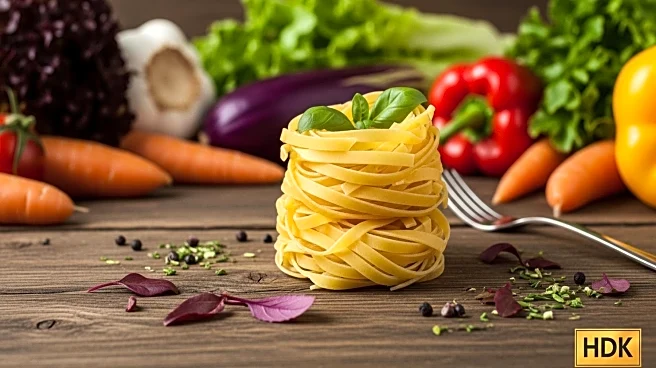What is the story about?
What's Happening?
Natural Grocers, a leading family-operated natural and organic grocery retailer, has announced the expansion of its private-label brand with the introduction of Organic Egg Pasta. This new product line includes three varieties: Tagliatelle, Pappardelle, and Reginelle, all crafted with fresh eggs and premium durum wheat semolina. The pasta is certified organic, non-GMO, and free from synthetic colors, artificial flavors, and preservatives. The company emphasizes the traditional Italian culinary methods used in the pasta's production, ensuring a delicate texture and rich flavor. The pasta is available at a special introductory price of $4.29 per 8.8 oz package until September 27, 2025, after which it will be priced at $4.79.
Why It's Important?
The introduction of Organic Egg Pasta by Natural Grocers highlights the growing consumer demand for organic and non-GMO products. This expansion reflects the company's commitment to providing high-quality, affordable organic food options. As consumers become increasingly health-conscious, the availability of such products can influence market trends and encourage other retailers to enhance their organic offerings. This move also supports sustainable agricultural practices by promoting products made without synthetic additives, aligning with broader environmental and health goals.
What's Next?
Natural Grocers plans to continue expanding its private-label product line, with more premium-quality, affordable products expected in the future. The company’s focus on organic and non-GMO products may lead to increased competition among grocery retailers, potentially driving innovation and price adjustments in the organic food sector. Additionally, consumer feedback on the new pasta varieties could influence future product development and marketing strategies.
Beyond the Headlines
The expansion of Natural Grocers' private-label brand may have implications for the broader grocery industry, particularly in terms of supply chain dynamics and sourcing practices. As demand for organic products grows, suppliers may need to adapt to meet these requirements, potentially affecting pricing and availability. Furthermore, the emphasis on traditional culinary methods and high-quality ingredients could inspire a cultural shift towards valuing artisanal food production.

















